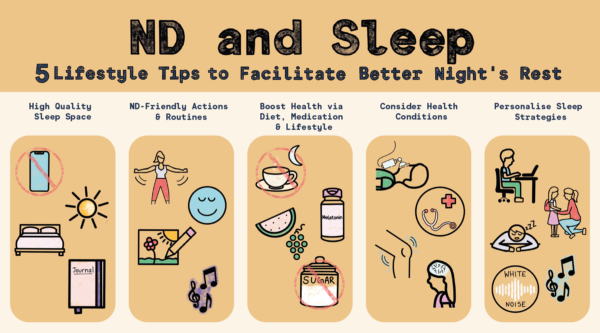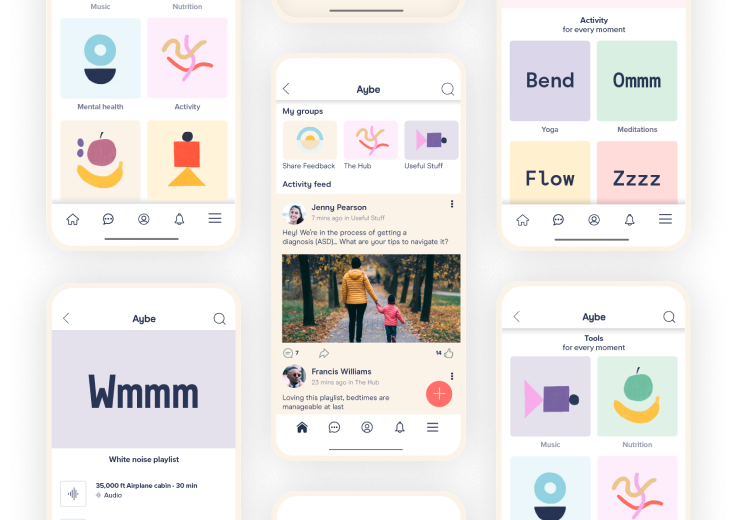ND and Sleep: 5 Lifestyle Strategies to Facilitate a Better Night’s Rest

Insufficient sleep can lead to heightened symptoms for neurodivergents, which then often leads to sleep being more difficult. The cycle can be difficult to manage, especially when some parts of our habits and schedules are impacted by outside factors like school and work. There are, however, some lifestyle strategies that you can engage in for a better night’s rest.
We covered the short and long term outcomes that may develop from chronic sleep issues and what sleep difficulties can look like for ADHD and ASC in our article “ND and Sleep Difficulties”. Here, we’ll cover some tips and tricks that can help you adjust sleep habits and hygiene in order to get better sleep.
Join the Community
Download the app to access more specialist advice, community support and wellbeing tools.
Join today as a Contributor member to gain free* access!
Download now
*Free access, in return for contributing to Aybe on a weekly basis, for example by commenting, liking, responding to feedback requests. See Terms & Conditions.

5 Simple Ways to Improve Your Sleep
Like most symptoms or impacts of neurodiverse conditions, there’s no perfect answer for what will work best for your situation. However, there are things you can try as you build supports and systems that lead to the improvements you would like.

ND and Sleep: 5 Lifestyle Tips for a Better Night’s Rest
1. Curate High-Quality Sleep Space
- Limit screens (especially close to bedtime) and keep as much light and noise out of the sleeping space as possible.
- Get sufficient light exposure in the morning and throughout the day to tune into the Circadian rhythm and boost Melatonin release.
- Create a sleep space with comfortable surfaces, textures, and temperature.
- Think through what may keep you from falling asleep and troubleshoot to find support like a way to journal your thoughts, if you often find yourself thinking through a list of things you don’t want to forget.
2. Create ND-Friendly Actions and Routines
Your actions and routines throughout the day will impact your body and your sleep when you finally head off to bed, so find what works for you. This may mean:
- Exercise (earlier in the day, if possible),
- Time to enjoy a hobby or be creative,
- Journaling out your thoughts or gratitude, or
- Relaxation methods like reading, baths, music, meditation, massage, and breathing exercises.
- A consistent bedtime routine can be a big help, especially when paired with elements like dimming lights and selecting certain music to associate with bedtime (check out our Bed Time and Deep Sleep music playlists).
- For children, focusing on play as a support can be effective. As we covered, it can help regulate and process emotions and release energy to help with falling asleep.
3. Boost Health Through Diet, Medication, and Lifestyle
Pay attention to what helps you feel at your best. If there is anything that seems to hold sleep off, talk to your medical providers about what they recommend to help keep your sleep habits on track.
- Keep track of caffeine and sugar intake and limit consumption later in the afternoon, the timing of any stimulant medications, alcohol intake, or eating food close to bedtime.
- A doctor may also recommend adding in things like Melatonin or adjusting your diet or medication to something different.
- An integrative approach to nutrition can do a lot to support these changes! It can support overall health, lower some impacts of symptoms from conditions, and help regulate emotions that may keep you from falling or staying asleep.
4. Consider Health Conditions
Many neurodiverse conditions can co-occur with medical problems that disrupt a healthy sleep schedule, so it’s important to consider those. Examples of common problems or disorders would be sleep apnea, 35 to 44% of ADHDers showing symptoms of restless leg syndrome, gastrointestinal issues, seizures, or mental health conditions like anxiety. Your doctor can help identify if any of those kinds of issues could be impacting your sleep and recommend ways to address them.
5. Personalise Sleep Strategies
Have a flexible schedule that allows you to lean into a slightly later bedtime without sacrificing your full night’s sleep? Great! But if your situation doesn’t allow for a direct solution, do your best to work around it by finding supports that counteract impacts you can’t remove. (An example would be a white noise machine or soothing music for street noise or finding ways to work naps into a schedule where bedtime and school start times are less flexible.)
Be flexible and patient with the process.
There’s no standard combination that will be the perfect solution for everyone. Don’t stress out trying to change everything at once and take time to celebrate the small improvements you see along the way. Even as you find some solutions that work for you, don’t worry if some days or months seem to go more smoothly than others.
As people grow, life changes. When new needs or options pop up, you may find that a new combination works better. It’s a lifelong part of supporting our health and well-being, not a problem we have to solve perfectly once and for all!
Are you or your child experiencing sleep difficulties? Have you tried anything that works? Want to find out more about the common health conditions associated to neurodivergent’s sleep difficulties? What information or resources would be helpful for you?
Share your thoughts and stories in the community!
Join the Community
Download the app to access more specialist advice, community support and wellbeing tools.
Join today as a Contributor member to gain free* access!
Download now
*Free access, in return for contributing to Aybe on a weekly basis, for example by commenting, liking, responding to feedback requests. See Terms & Conditions.

An Important Note: Our initial focus here at Aybe is on some of the most common genetically inherited neurodivergent conditions such as Autistic Spectrum Condition and ADHD, but we’d love to hear your stories and your requests and feedback on any area you’d like to have more information on as we grow. Let us know what you think in the Community!




